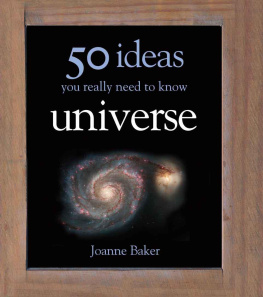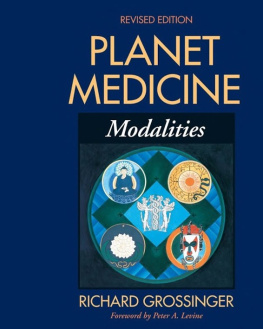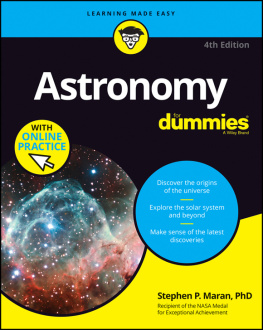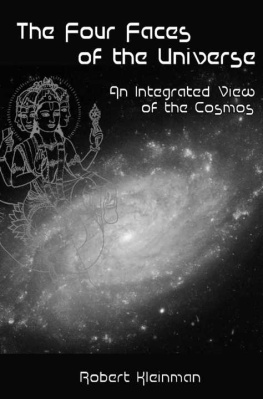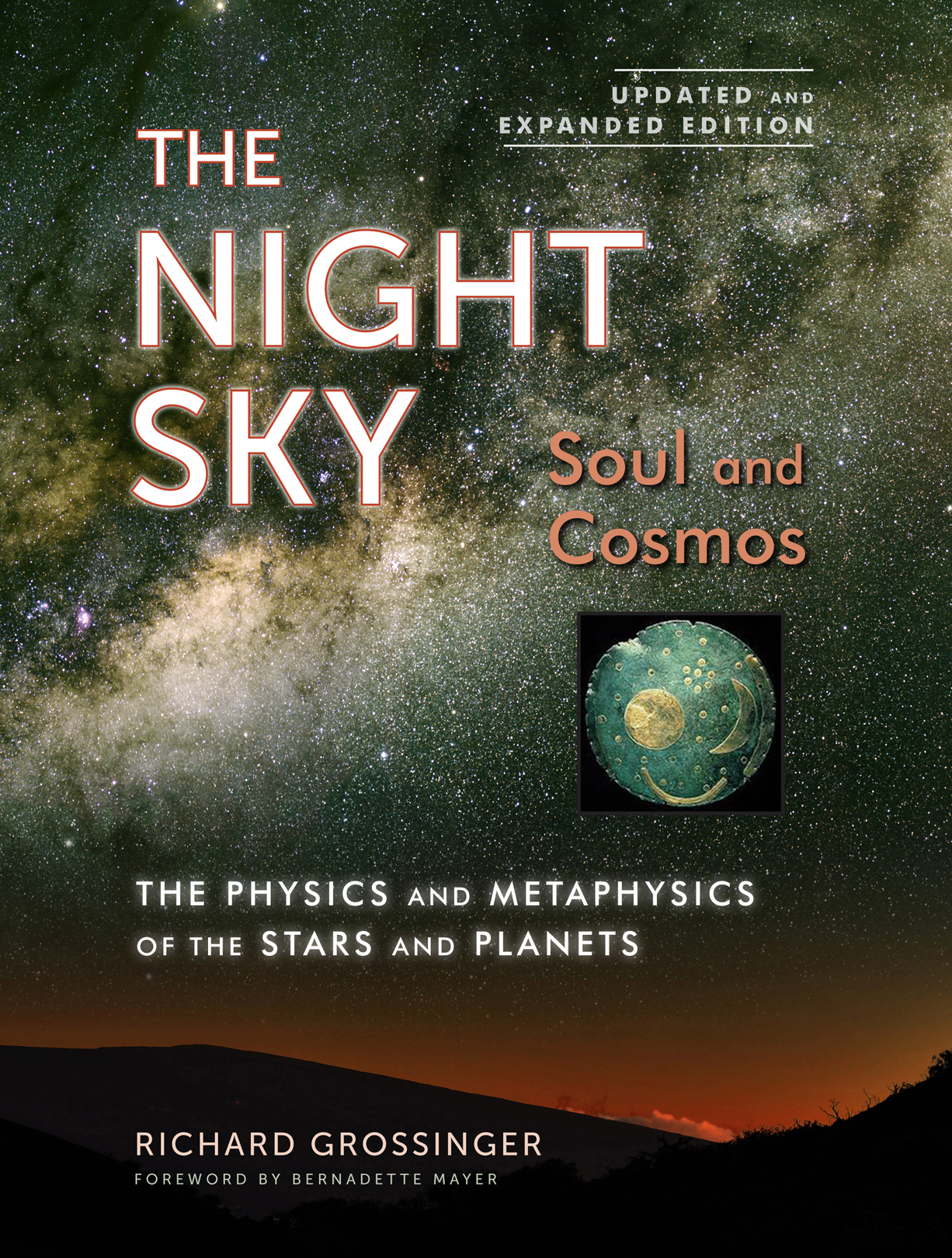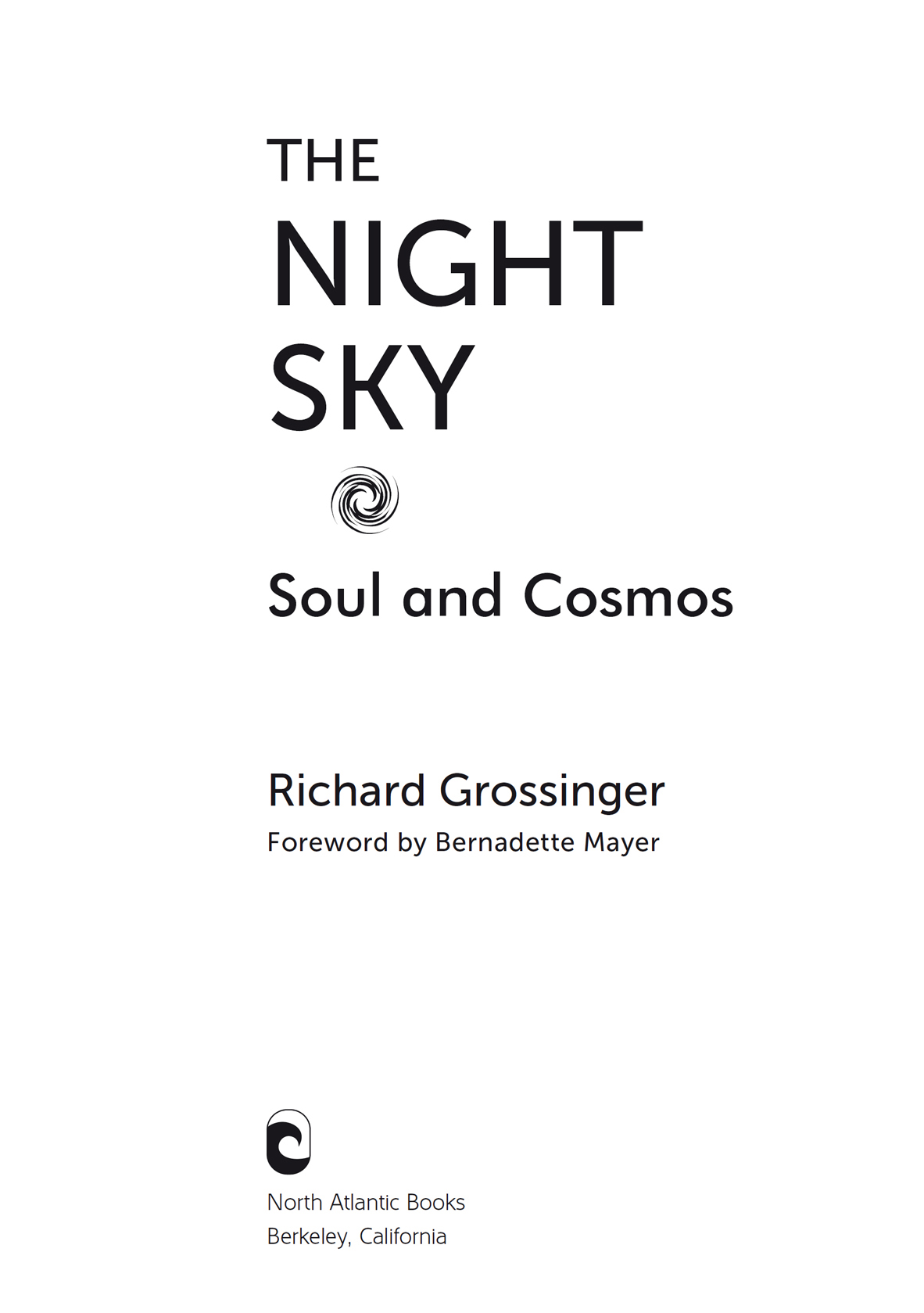O THER BOOKS BY R ICHARD G ROSSINGER
Dark Pool of Light, Vol 1, The Neuroscience, Evolution, and Ontology of Consciousness
Dark Pool of Light, Vol 2, Consciousness in Psychospiritual and Psychic Ranges
Dark Pool of Light, Vol 3, The Crisis and Future of Consciousness
2013: Raising the Earth to the Next Vibration
The Bardo of Waking Life
Book of the Cranberry Islands
Book of the Earth and Sky
The Continents
Embryogenesis: Species, Gender, and Identity
Embryos, Galaxies, and Sentient Beings: How the Universe Makes Life
Homeopathy: The Great Riddle
The Long Body of the Dream
Migraine Auras: When the Visual World Fails
New Moon
The New York Mets: Ethnography, Myth, and Subtext
On the Integration of Nature: Post-9/11 Biopolitical Notes
Out of Babylon: Ghosts of Grossingers
Planet Medicine: Origins
Planet Medicine: Modalities
The Provinces
The Slag of Creation
Solar Journal: Oecological Sections
The Unfinished Business of Doctor Hermes
Waiting for the Martian Express: Cosmic Visitors, Earth Warriors, Luminous Dreams
A S EDITOR OR COEDITOR
The Alchemical Tradition in the Late Twentieth Century
Baseball I Gave You All the Best Years of My Life
Ecology and Consciousness
Into the Temple of Baseball
Nuclear Strategy and the Code of the Warrior
Olson-Melville Sourcebook: The Mediterranean
Olson-Melville Sourcebook: The New Found Land
Pluto: New Horizon for a Lost HorizonAstronomy, Astrology, Mythology
See http://www.richardgrossinger.com/2010/03/books-by-richard-grossinger/for full list.
Copyright 1982, 1988, 2014 by Richard Grossinger. All rights reserved. No portion of this book, except for brief review, may be reproduced, stored in a retrieval system, or transmitted in any form or by any meanselectronic, mechanical, photocopying, recording, or otherwisewithout the written permission of the publisher. For information contact North Atlantic Books.
| Published by North Atlantic Books | Cover photo Marcel Clemens/Shutterstock.com |
| P.O. Box 12327 | Back cover inserts: Pawnee Star Map: c. 1700; |
| Berkeley, California 94712 | Nebra Sky Disk: Dbachmann, Wikimedia Commons |
| Cover and book design by Susan Quasha |
The Night Sky: Soul and Cosmos is sponsored and published by the Society for the Study of Native Arts and Sciences (dba North Atlantic Books), an educational nonprofit based in Berkeley, California, that collaborates with partners to develop cross-cultural perspectives, nurture holistic views of art, science, the humanities, and healing, and seed personal and global transformation by publishing work on the relationship of body, spirit, and nature.
North Atlantic Books publications are available through most bookstores. For further information, visit our website at www.northatlanticbooks.com or call 8007333000.
Library of Congress Cataloging-in-Publication Data
Grossinger, Richard, 1944- author.
The night sky : soul and cosmos, the physics and metaphysics of the stars and planets / Richard Grossinger ; foreword by Bernadette Mayer. Updated and expanded edition.
pages cm
Summary: Over the course of human history, our perception of the universe has changed along with the developments on our own planet within our own societies. Richard Grossinger traces our perception of the universe and covers multiple aspects of humanitys complex relationship with the cosmos Provided by publisher.
eBook ISBN: 978-1-58394-711-1
Trade Paperback ISBN: 978-1-58394-710-4
1. AstronomyPopular works. I. Title.
QB44.3.G76 2014
520dc23
v3.1
For Dana Wilde and James Ryan Connelly

For the opposition star folkCarl Sagan, Jeffrey Hoffman, Neil deGrasse Tyson (my NYC homeboys), et al.; for the fierce materialists too (Patricia Churchland, Richard Dawkins, Richard Feynman, Stephen Hawking, etcet .). Yeah, we dont line up a bit, this book lying dead opposite your celestial fare. But despite the current unmitigated cosmos (and impasse), were in this one together, for the long haul. May we and all other sentient beings, of every size, shape, and disposition, everywhere in All That Is, make it safely to the jamboree, as whoever we are.
Note for the Reader

The 2014 revised edition of The Night Sky completes a nine-book project that began without a blueprint and ran for about thirty-six years while I investigated four main topicsmedicine, cosmology, embryology, and consciousnesseach from a combination of scientific, anthropological, historical, and esoteric viewpoints. My premise is that science is telling us half or less of what it is doing.
Yet because its blueprint is so ingeniously contrived, the things people do with it so significant, and the effects they achieve so critical to our lives (especially on a planet that now far exceeds its carrying capacity), practitioners of science have the illusion that their enterprise has been uniquely validated and that it holds its own basethey believe their cover stories. Most of the public believes them too.
In truth, science mainly proves that what we dont know about the universe is far more than what we do.
My plan has been to track the fringe between what science can get at and what it cant, the shape of its boundaries as well as their near frontiers.
I am looking for sciences actual meaning, its unspoken credos and subtexts: what it is telling us and what it is not telling us, especially what it is not telling us about what it is not telling us. I am also taking a shot at what the universe itself might be telling us.
Sciences incompleteness dilemma is ontological and multi-tiered, and the various paths into (and out of) it are also multi-tiered, each in its own way. Of course, science will not admit that there is anything, in principle, that it cant get at.
The universe that science cant get at it is the universe of our being, e.g., our basis as cosmic witnesses, our responses to our eerie egoic awakening in an undisclosed place. This is a huge territory, and one barely touched by psychology or neuroscience, though they travel long, proxy distances and file voluminous reports. The real universe has joys, sorrows, aesthetics, paradoxes, pranks, humor, envy, love, play, rage, and empathy, as well as a whole lot else, none of which are in sciences playbook in the way that they are actually in the universe.
Philosophers make a valiant attempt to get at a universe that includes us, but I have never been a logician. Professors of philosophy (and their partisans) were on my case big-time in college and graduate school, as they should have been once they grokked the difference between what they were teaching and I was doing. They thought that I was getting away with murder while giving myself a free ride to go anywhere. I was and still am, but most of them were getting away with murder too (under academic privilege) and using it to go nowhere or around in circles.
We dont have to source the universe that science cant get at because we are it. It expresses itself through us despite our muddles, trespasses, and peremptory objectifications. It dwarfs science and philosophy as we dwarf science and philosophy, for there is no description of the universe that is not itself based on an indescribable situation: meaning itself. Plus there is no account of the universe that does not have a sovereign by-product. Just look around at pretty much everything, or at least everything that wasnt here before we arrived. Even most of what comes out of science no longer bothers to give it the time of day.


